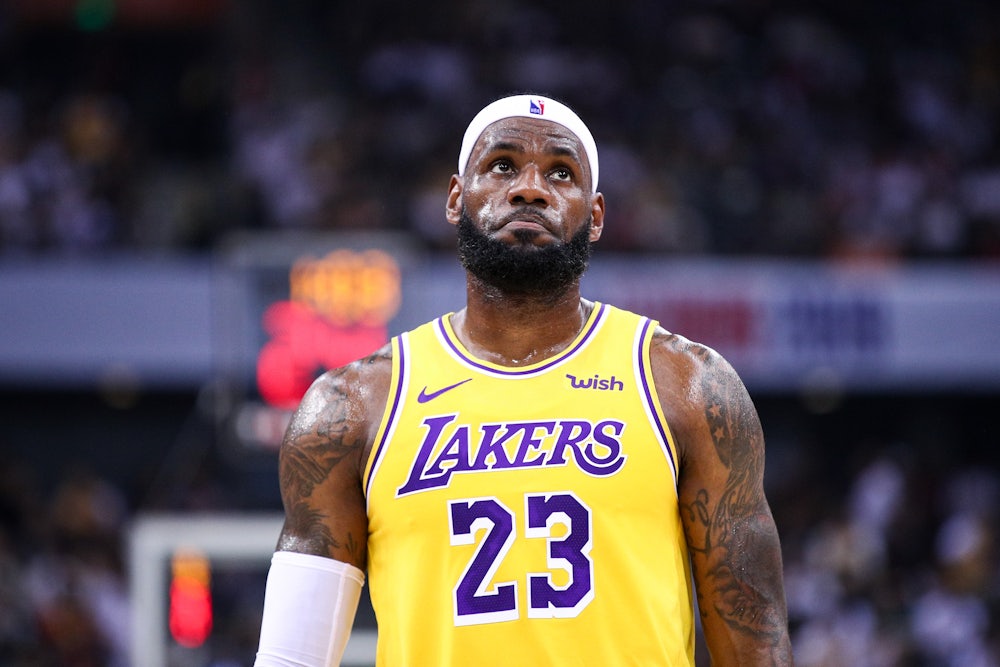There were many things LeBron James could have said earlier this week when asked about the pro-democracy protests in Hong Kong. He could have, like Houston Rockets General Manager Daryl Morey, expressed tepid support for the protesters. He could have, like new Brooklyn Nets owner Joe Tsai, made the case that this was a complicated geopolitical situation, even if the protesters’ basic demand—more democratic rule—isn’t really. He could have, like nearly everyone else in the National Basketball Association, kept his mouth shut and, if pushed, indicated that the whole thing is too distant for him to have any educated opinion on.
James did not do any of these things, however. Instead, just as the controversy that consumed the NBA for over a week seemed to be dying down, James used his considerable platform to throw Morey under the bus for costing the league money:
I think when we all sit back and learn from the situation that happened, understand that what you could tweet or could say. We all talk about this freedom of speech. Yes, we all do have freedom of speech, but at times there are ramifications for the negative that can happen when you’re not thinking about others, and you’re only thinking about yourself.
I don’t want to get into a word or sentence feud with Daryl Morey, but I believe he wasn’t educated on the situation at hand, and he spoke, and so many people could have been harmed, not only financially, but physically. Emotionally. Spiritually. So just be careful what we tweet and what we say, and what we do. Even though yes, we do have freedom of speech, but there can be a lot of negative that comes with that too.
James later clarified that he wasn’t speaking about the substance of Morey’s tweet. He wasn’t commenting on the validity of the protests in Hong Kong. Rather, he was chiding the Rockets GM for saying anything at all.
While James’s concern for the safety of himself and his teammates is understandable, he was speaking as a businessman. James, like other professional basketball players, has made many trips to China, which is seen as a goldmine. China severed a number of economic ties with the NBA in the wake of Morey’s comments, costing the league and its players millions of dollars. Reporting over the last few days has revealed that one of James’s teammates saw a $1 million endorsement deal go up in smoke. Other players have certainly lost money as well.
James was playing politics when he spoke—the politics of the NBA, not global politics. When NBA Commissioner Adam Silver spoke to members of the Los Angeles Lakers and Brooklyn Nets, who were playing exhibition games in China, James grilled him, according to ESPN’s Dave McMenamin. He reportedly asked what consequences there would be for Morey. The former vice president of the NBA Players Association, James was concerned about the league’s treatment of players: “James, to paraphrase, told Silver that he knew that if a player caused the same type of uproar with something he said or tweeted, the player wouldn’t be able to skate on it.” In other words, if a player had done something that resulted in millions of lost revenue, there would be consequences.
Some of the criticism that James has received, particularly from right-wingers, has been absurd and opportunistic. Many of the same people who insisted he “shut up and dribble” instead of commenting on the president being a racist or the murder of Eric Garner, are now dragging him for not standing in solidarity with Hong Kong’s pro-democracy movement. But the NBA is certainly not the first American corporation to debase itself in pursuit of Chinese money, and blaming James for that decision is silly.
Still, his statements were disappointing. James has, over the last several years, walked a remarkably difficult tightrope. He has used his platform to bring attention to serious issues, like police brutality and gun control, while being the greatest basketball player in the world and expanding his financial empire. These are all difficult tasks, and they’re not necessarily complementary. James has pursued them all without seeming to make either financial or ethical sacrifices.
With China, he stumbled. The ethical and financial incentives were misaligned. He could have done the right thing and expressed support for the demonstrators, or he could salvage his business interests. He chose the latter.
James has, despite being one of the most famous people on the planet since he was a teenager, built a public image as a deeply uncynical person. Michael Jordan may not have said “Republicans buy sneakers, too,” but he refused to take political stands for decades, in part out of fear that they would damage his bottom line. James has never stayed silent, becoming a model woke superstar. He undid a lot of that work this week.
